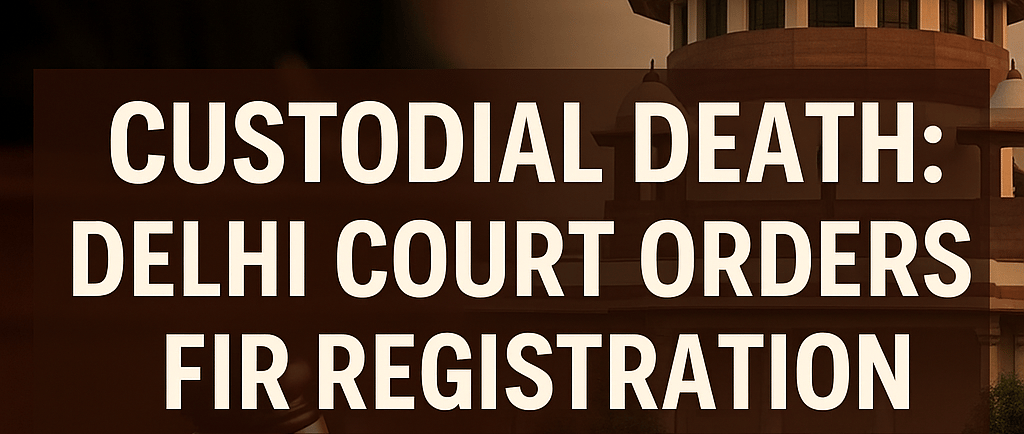⚖️ Delhi Court Orders FIR in Alleged Custodial Death of Sheikh Shadat at Subhash Place Police Station
In a crucial order, the Chief Judicial Magistrate of Rohini Court has directed the Delhi Police to register an FIR in the alleged custodial death of Sheikh Shadat. The court observed injury marks on the deceased and ruled that a cognizable offence appears to have been committed, warranting a detailed investigation, including CCTV footage analysis. This judgment marks a strong stance on police accountability and custodial justice.
ADV NADEEM SAIFI | PARTNER | ALTIUS ASTRA ATTORNEYS
6/17/20253 min read


Rohini Courts, Delhi – May 28, 2025: In a significant development highlighting concerns over custodial deaths in India, the Chief Judicial Magistrate (CJM), Rohini, has directed the registration of a First Information Report (FIR) into the death of Sheikh Shadat, who allegedly died while in Delhi Police custody at Subhash Place Police Station in July 2023.
This order was passed in a petition filed under Section 156(3) CrPC by Setara Bibi, the wife of the deceased, who alleged that her husband was tortured in custody, resulting in his death. Despite repeated complaints to police authorities, no FIR had been registered for over 10 months.
📌 Background of the Case
On July 21, 2023, Sheikh Shadat and four others were picked up by police officers at Netaji Subhash Place. According to Setara Bibi's complaint, her husband questioned the police over unlawful detention, after which officers allegedly became aggressive and forcibly took them to Subhash Place Police Station.
The next day, an FIR under the Arms Act was registered against the group. On July 23, Shadat’s family was informed that he had been admitted to Ambedkar Hospital. When his wife reached the hospital, she was shown his dead body in the mortuary.
Sheikh Shadat’s body reportedly bore visible black-and-blue injury marks, swollen limbs, and wounds on his back and chest. A video of the deceased was recorded by his family as evidence.
Despite the family’s written complaints and applications to senior police officials, no FIR was registered. The police claimed that a judicial inquest had concluded the death was due to coronary artery disease, ruling out homicide or suicide.
🔍 Court’s Key Observations
CJM Vasundhara Chhaunkar noted the following:
Photographic and video evidence submitted by the complainant showed serious injury marks on the deceased’s upper and lower back.
The inquest report alone could not justify the dismissal of the application.
The complainant was not in a position to collect or preserve crucial evidence, like CCTV footage from the police station.
A technical investigation was necessary, including whether CCTV footage existed and was preserved, and to record statements from all potential witnesses.
“To dismiss the present application only on the basis of the inquest report will not serve the purpose of justice where the complainant is not in a position to collect extensive evidence… Prima facie, a cognizable offence has been committed,” the CJM ruled.
📌 Legal Framework Referenced
The Court cited key precedents, including:
D.K. Basu v. State of West Bengal – Laying down safeguards against custodial torture.
Parambir Singh Saini v. Baljeet Singh – Regarding mandatory CCTV installation in police stations.
Skipper Beverages v. State – On judicial discretion under Section 156(3) CrPC when complainants are unable to gather evidence themselves.
📝 Court Direction
The Station House Officer (SHO) of Subhash Place Police Station has been directed to:
Register an FIR based on Setara Bibi’s complaint.
Submit a compliance report to the Court by June 28, 2025.
The complainant was represented by Advocates Dushyant Kumar, Mangla Verma, Sanjana Srikumar, Joicy, and Hamza Tariq, with arguments led by Adv. Sanjana Srikumar.
⚖️ Why This Judgment Matters
This case brings attention to:
The delay and denial of FIR registration in alleged custodial deaths.
The responsibility of police officers is to maintain transparency and accountability.
The importance of judicial oversight when fundamental rights under Article 21 (Right to Life) are at stake.
The ruling is expected to contribute significantly to the ongoing dialogue around police reform, custodial violence, and the rights of detainees under Indian law.
📣 Conclusion
This court order is not just a legal directive but a call for accountability. It underlines the power of legal remedies available to citizens, especially in cases where the state machinery fails to act. The Delhi judiciary’s intervention stands as a reminder that every death in custody must be thoroughly investigated, irrespective of preliminary reports.
Altius Astra Attorneys
A premier law firm based in Delhi, India, offering legal representation across various practice areas for citizens rights and interests.
© 2025. Altius Astra Attorneys. All rights reserved.
Contact Us
📞 9899290789, 9818786756
📧 contact@altiusastra.com
3C-ED Block, Madhuban Chowk, Pitampura, Delhi-110034
DISCLAIMER
